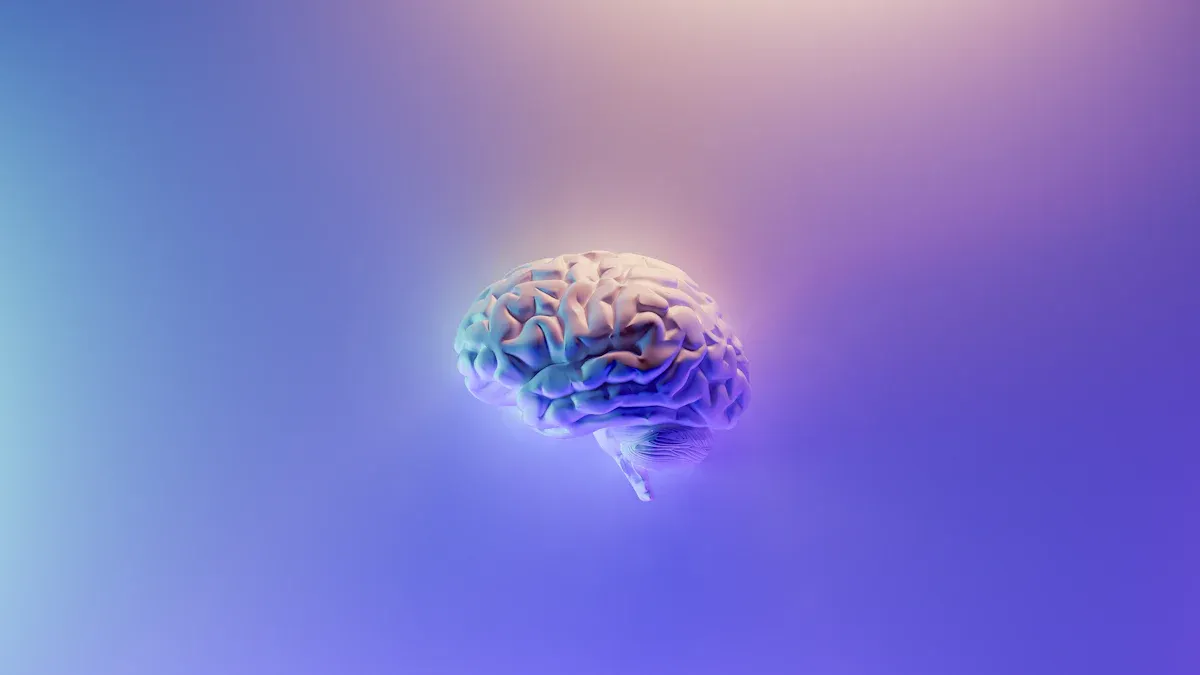How to Manage Chemo Brain and Improve Cognitive Skills

You might feel frustrated when memory slips or focus fades after cancer treatment. You are not alone. Research shows that up to 75% of people with cancer experience chemo brain, making it a common part of the journey. The good news? You can manage these changes. Simple steps like using planners, taking regular breaks, and practicing relaxation techniques can help. Some people also find value in Cognitive Rehabilitation: Managing 'Chemo Brain' for extra support. You have options to feel more in control each day.
Key Takeaways
Chemo brain is common after cancer treatment and causes memory and focus problems, but symptoms often improve over time.
Good sleep, regular exercise, and healthy eating help your brain recover and work better.
Using tools like planners, reminders, and breaking tasks into small steps can make daily life easier.
Brain training exercises, yoga, and meditation support thinking skills and reduce stress.
If memory or focus problems interfere with life, ask your doctor about professional help and support programs.
What Is Chemo Brain?

Symptoms
Chemo brain can make you feel like your mind is in a fog. You might notice that your brain just does not work the way it used to. Many people going through cancer treatment report changes in how they think and remember things. Here are some of the most common symptoms you might experience:
Memory lapses, like forgetting things you usually remember
Trouble focusing or keeping your attention on one thing
Difficulty remembering names, dates, or important events
Problems planning your day or making decisions
Losing track of tasks when you try to do more than one thing at a time
Finding it hard to learn new information
Feeling disorganized or taking longer to finish tasks
Struggling to find the right words when you speak
Tip: You are not alone if you notice these changes. Many people feel frustrated, but these symptoms are common and usually get better with time.
Duration
You might wonder how long chemo brain will last. The answer is different for everyone, but here is what studies and patient stories show:
Many people notice symptoms for about six months after finishing chemotherapy.
Some people feel better in a few months, while others may notice changes for several years.
Sometimes, symptoms are so mild that only you notice them. Other times, they can make daily life harder.
One breast cancer survivor said her mental fog lasted about a year before things improved.
Most people find that symptoms slowly fade, but it can take months or even years.
Chemo brain happens because chemotherapy can damage certain brain cells and cause inflammation. These changes affect how your brain cells talk to each other and how blood flows in your brain. This can lead to problems with memory, focus, and thinking. Scientists are still learning about these changes, but they know that both the treatment and the body’s response play a role.
Self-Care

Taking care of yourself is one of the best ways to manage chemo brain. You can boost your brain health by focusing on three main areas: sleep, physical activity, and what you eat and drink. Let’s break down how each one helps your mind stay sharp and clear.
Sleep and Rest
Getting good sleep is like giving your brain a nightly tune-up. When you sleep well, your brain clears out waste and repairs itself. If you wake up a lot at night or feel tired during the day, your brain may have trouble focusing, remembering things, or learning new information. Poor sleep can also make you feel more forgetful and less alert.
Try to go to bed and wake up at the same time every day.
Keep your bedroom cool, dark, and quiet.
Avoid screens and bright lights before bedtime.
Take short naps if you feel tired, but keep them under 30 minutes.
Tip: If you notice you feel foggy or forgetful after a bad night’s sleep, you are not imagining it. Sleep problems can make chemo brain worse. Improving your sleep quality can help your memory, attention, and mood.
Researchers have found that sleep problems can lead to more cognitive fatigue, trouble paying attention, and slower thinking. For women, poor sleep can especially affect planning and decision-making skills. Good sleep helps your brain clear out harmful substances, which keeps your mind working better.
Exercise and Activity
Moving your body helps your brain, too. Regular exercise boosts blood flow to your brain and encourages the growth of new brain cells. You do not need to run a marathon—simple activities count.
Try brisk walking, cycling, or swimming for 30 minutes most days.
Add strength exercises, like lifting light weights or using resistance bands, twice a week.
Gentle activities like yoga, tai chi, or qigong can also help your mind and body relax.
Note: Even if you cannot meet the full exercise guidelines, any movement is better than none. Start slow and listen to your body.
Studies show that people who stay active during and after chemotherapy often have better memory, attention, and problem-solving skills. Exercise can also help you feel less tired and more positive. Mind-body exercises like yoga and tai chi are especially helpful because they combine movement with relaxation, which can lower stress and improve how you feel overall.
Here’s a quick look at how different self-care practices support your brain:
Self-Care Practice Category | Examples | Cognitive Benefits |
|---|---|---|
Psychoeducational & Psychosocial | Stress management, muscle relaxation, self-care | Better memory, language, and planning |
Cognitive Behavioral Therapy (CBT) | Memory training, emotional freedom techniques | Improved memory and executive function |
Exercise-Based Interventions | Aerobic exercise, strength training, yoga | Sharper focus, less brain fog |
Acupuncture | Acupuncture therapy | Better attention and concentration |
Nutrition and Hydration
What you eat and drink matters for your brain. A diet rich in fruits, vegetables, and antioxidants can protect your brain cells from damage caused by chemotherapy. Antioxidants help fight off harmful molecules called free radicals, which can hurt your memory and thinking skills.
Fill your plate with colorful fruits and vegetables every day.
Choose whole grains, lean proteins, and healthy fats like nuts and olive oil.
Drink plenty of water to stay hydrated.
Limit sugary drinks and processed foods.
Tip: Foods high in antioxidants include berries, spinach, broccoli, nuts, and dark chocolate.
Research suggests that people who eat more fruits and vegetables tend to have better memory and thinking skills after cancer treatment. Antioxidant vitamins, like vitamin C, may help protect your brain from the effects of chemotherapy. Staying hydrated is just as important—dehydration can make you feel tired and unfocused.
You can also try herbal teas or add lemon and berries to your water for extra flavor and nutrients. Eating well and drinking enough fluids gives your brain the fuel it needs to recover and stay sharp.
Daily Strategies
Routines and Organization
Keeping your day organized can make a big difference when you have chemo brain. You might find it helpful to use memory aids like calendars, sticky notes, or digital reminder apps. These tools help you remember appointments, tasks, and even when to take your medicine. Many people like using smartphone apps because they send alerts and keep everything in one place. You can also try keeping a notebook or whiteboard in a spot you see every day.
Set regular times for waking up, eating, and going to bed.
Use checklists or to-do lists to track your daily tasks.
Keep important items, like keys or glasses, in the same place.
Break big tasks into smaller steps so they feel less overwhelming.
Tip: Try apps like Bearable or Magic ToDo if you want extra help with reminders and organizing your day.
Focus and Limiting Distractions
Staying focused can feel tough, but small changes help. Start by working on one thing at a time. Multitasking can make you feel more confused or forgetful. Find a quiet spot to work or study. Turn off phone notifications and close extra tabs on your computer. If you get distracted, jot down the thought and come back to it later.
Break tasks into smaller parts and take short breaks.
Use alarms or timers to help you stay on track.
Try puzzles or word games to train your brain and boost attention.
Practice deep breathing or short meditation to calm your mind.
Note: Chewing gum or repeating information out loud can also help you stay alert and remember things better.
Communication and Support
Talking about chemo brain with family and friends can make things easier. Let them know what you are going through. You might use simple words, stories, or even jokes to explain your memory slips. Writing things down or using visual aids can help others understand your needs.
“Sharing your experience with others who understand can make you feel less alone. Peer groups and open conversations help you cope and find new ways to manage daily life.”
Ask for help when you need it. Support from loved ones, caregivers, or peer groups can lift your mood and help you stick to routines. If you struggle to explain your challenges, try using notes or ask a speech therapist for tips. Remember, you do not have to manage chemo brain by yourself.
Cognitive Rehabilitation: Managing 'Chemo Brain'
If you want to take a more active role in improving your thinking skills, Cognitive Rehabilitation: Managing 'Chemo Brain' can help. This approach uses special exercises, therapies, and support to boost your memory, attention, and problem-solving skills. Many people find that these programs make daily life easier and help them feel more confident.
Brain Training
You can train your brain just like you train your muscles. Cognitive Rehabilitation: Managing 'Chemo Brain' often includes brain training exercises that target memory, attention, and executive function. These activities might look simple, but they can make a big difference over time.
Try puzzles, word games, or memory games. These challenge your brain and help it grow stronger.
Use apps or online programs designed for brain training. Many of these programs adjust to your skill level and focus on areas where you need the most help.
Practice tasks that require focus, like sorting cards, matching pictures, or repeating patterns.
Tip: Doing these exercises regularly can help your brain build new connections. This process, called neuroplasticity, lets your brain adapt and recover from chemo brain.
Studies show that people who use computer-assisted Cognitive Rehabilitation: Managing 'Chemo Brain' programs see real improvements in memory and attention. These programs can also help with mood and quality of life. Even simple activities like crossword puzzles or jigsaw puzzles can help your brain stay sharp. Aerobic exercise, such as brisk walking or cycling, also supports brain health and can improve how you feel about your thinking skills.
Yoga and meditation are other great tools. Yoga combines movement, breathing, and mindfulness, which can help you focus better and feel less stressed. Meditation teaches you to pay attention to the present moment, which can calm your mind and improve memory. Some studies show that yoga and meditation can even change the way your brain works, making it easier to pay attention and remember things.
Professional Help
Sometimes, you need extra support. If you notice that memory problems or trouble focusing make daily life hard, it might be time to ask for professional help. Cognitive Rehabilitation: Managing 'Chemo Brain' with a trained therapist can give you a personalized plan to tackle your challenges.
Here are some signs that you might benefit from professional Cognitive Rehabilitation: Managing 'Chemo Brain':
You forget important things often, like appointments or names.
You have trouble following conversations or instructions.
You feel lost or confused at work, school, or home.
Your memory problems make you feel anxious or sad.
Healthcare providers can assess your symptoms using simple tests and questions. They may suggest therapies like cognitive training, occupational therapy, or speech therapy. These therapies teach you new ways to remember things, organize your day, and solve problems. Some programs use group sessions, while others offer one-on-one support or online options.
Note: National guidelines recommend Cognitive Rehabilitation: Managing 'Chemo Brain' as a first step for cancer survivors who notice thinking problems after treatment. Nurses and doctors can help you find the right program.
Mind-body treatments, such as yoga and meditation, are also part of many Cognitive Rehabilitation: Managing 'Chemo Brain' plans. These practices help reduce stress, improve sleep, and boost your mood. Some people also benefit from medications like antidepressants, which can help with memory and focus, even if you are not feeling depressed.
Here’s a quick table to show what you might find in a Cognitive Rehabilitation: Managing 'Chemo Brain' program:
Program Feature | What It Includes | How It Helps You |
|---|---|---|
Brain Training | Puzzles, memory games, online exercises | Improves memory and attention |
Mind-Body Practices | Yoga, meditation, breathing exercises | Reduces stress, boosts focus |
Professional Therapy | Cognitive training, occupational therapy | Teaches new skills and strategies |
Medication | Antidepressants, stimulants (if needed) | Supports brain recovery |
Support Groups | Peer support, group sessions | Shares tips and encouragement |
Long-term, people who use Cognitive Rehabilitation: Managing 'Chemo Brain' often see lasting improvements in memory, attention, and quality of life. These gains can last for months or even years after finishing therapy. You may also notice less anxiety, depression, and fatigue.
If you think you need help, talk to your healthcare provider. They can guide you to the right resources and make sure you get the support you need. Remember, you do not have to face chemo brain alone. With Cognitive Rehabilitation: Managing 'Chemo Brain', you can take steps to feel better and regain control of your mind.
You can improve your thinking skills after chemo. Many people see progress by taking small steps every day. Try these ideas:
Play brain games or try new hobbies to keep your mind active.
Eat healthy foods and get good sleep.
Ask for help from therapists or support groups.
You have the power to make changes. With time and practice, you can feel sharper and more confident again. 🌟
FAQ
What is the best way to explain chemo brain to others?
You can say, “Sometimes my memory and focus are not as sharp because of my treatment. It’s called chemo brain. I may need reminders or extra time.” Most people will understand and want to help.
Can chemo brain affect my work or school?
Yes, chemo brain can make tasks harder. You might forget things or lose focus. Try using planners, taking breaks, and asking for help when needed. Many people find these tools make work or school easier.
Will my memory and thinking skills go back to normal?
Most people see improvement over time. Your brain can heal and adapt. You may notice changes for months or even years, but many people feel much better with self-care and support.
Are there any foods that help with chemo brain?
Yes! Foods rich in antioxidants, like berries, nuts, and leafy greens, can help your brain. Drinking enough water also keeps you alert. Try to eat a colorful mix of fruits and vegetables every day.
When should I talk to my doctor about chemo brain?
If memory problems make daily life hard or cause stress, talk to your doctor. They can suggest therapies or refer you to a specialist. You do not have to manage this alone.
See Also
Recognizing Signs And Managing Choroid Plexus Carcinoma
A Guide To Symptoms And Care For Large Granular Lymphocytic Leukemia
Treatment Approaches For Acute Myeloid Dendritic Cell Leukemia
Exploring Cerebral Astrocytoma And Its Impact On Brain Function
Key Symptoms And Treatment Options For Adrenocortical Adenoma

